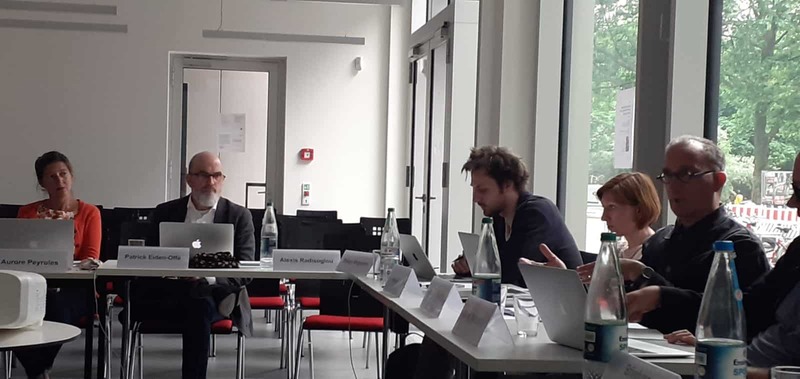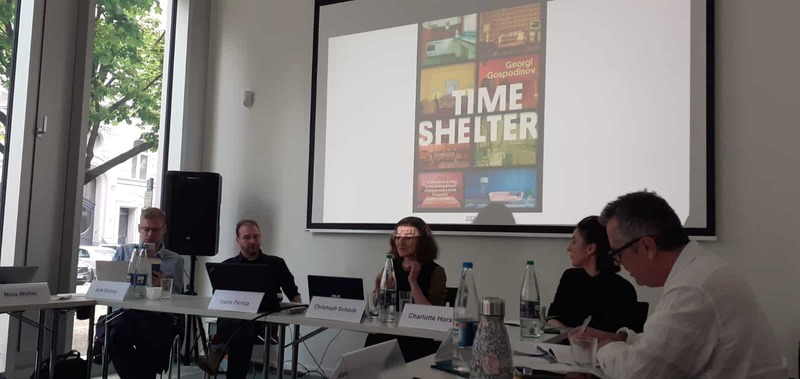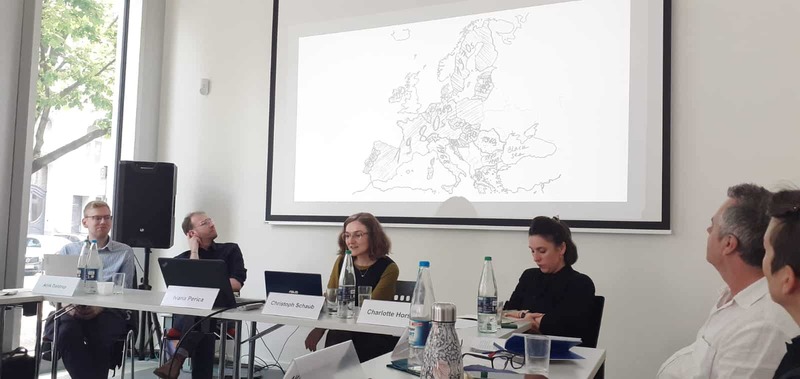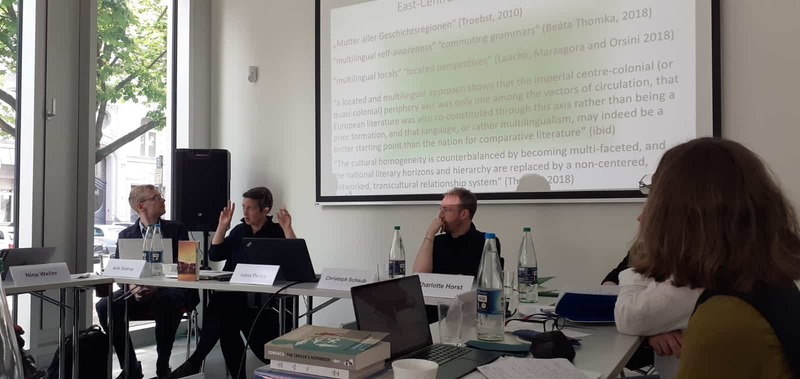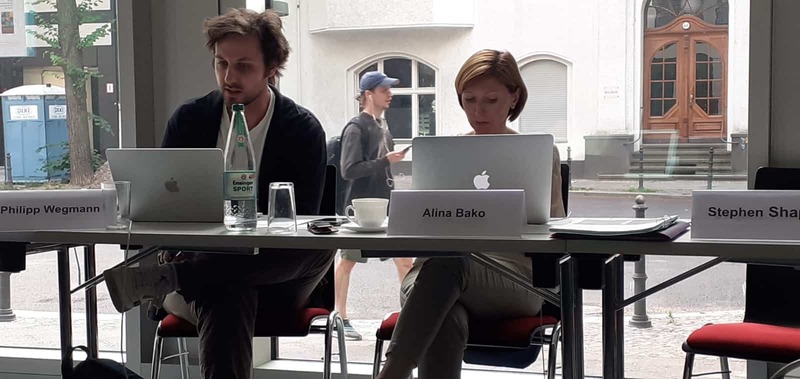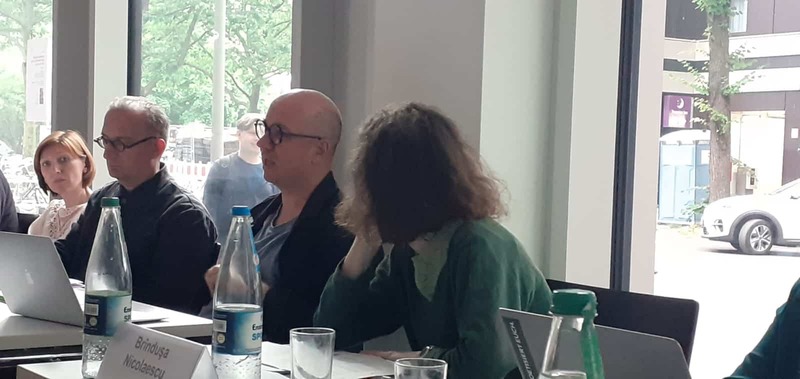Caponeu event
Research Workshop: European Centers and Peripheries in the Political Novel
Caponeu event06.06.2024 - 07.06.2024
Research workshop
Location: Leibniz-Zentrum für Literatur- und Kulturforschung, Pariser Str. 1, 10719 Berlin
Organized by: Kyung-Ho Cha, Patrick Eiden-Offe, Ivana Perica, Aurore Peyroles (alle ZfL), Johanna-Charlotte Horst (Martin-Luther-Universität Halle-Wittenberg), Christoph Schaub (Universität Vechta)
Contact: caponeu@zfl-berlin.org
When analyzing asymmetries between centers, semi-peripheries, and peripheries, literary scholars draw on various theoretical and methodological traditions, such as post- and decolonial approaches or, as for example the Warwick Research Collective, world-systems analysis. Some of these literary scholars rather emphasize asymmetries and exchanges between (the) European center(s) and non-European (semi-)peripheries, while paying less attention to how global economic centers such as Europe—whatever its boundaries may be—are marked by internal center-periphery-dynamics (e.g., between Germany, or France, and Eastern Europe). Additionally, sociological approaches in world literature studies (e.g., Pascale Casanova, Franco Moretti) focus on examining center-periphery dynamics in literary fields, or systems, and highlight how these dynamics influence literary form. They supplement approaches that analyze how specific literary texts represent center-periphery-asymmetries.
The workshop builds on these lines of inquiry, yet organizes its discussion around the question of how center-periphery-dynamics are articulated in explicitly political terms by the political novel, a genre that we tentatively understand as a set of procedures by means of which a novel is coded and decoded as political in a particular constellation of circumstances, resulting in it being recognized, or misread, as political. The workshop aims to put special emphasis on examining Europe as a combined and uneven formation characterized by economic, social, cultural, and literary asymmetries. Finally, we wish to investigate the question of what formal and textual features are common, if not typical, of literary capitals (centers) on the one hand and margins and peripheries on the other, as well as the question of how literary centers and peripheries respond to political novels – and how these literary texts, their authors, publishers, and reading publics anticipate, react to, and interact with these responses.
Further questions we hope to engage with are:
- To what extent are interrelations between different kinds of centers, semi-peripheries and peripheries represented in the political novel?
- Which topics are particularly relevant to and which aesthetic forms are particularly suitable for literary negotiations of economic, political, social, and cultural centers and peripheries?
- How have center-periphery-dynamics in the literary world-system and in the European literary field in particular affected aesthetic manifestations of the political novel in different European literary regions and in different historical contexts?
- How do the specifically European spatial and literary relations interact (uncover, reflect, problematize, counter, resist) with the relations between Europe and other regions across the globe?
- Can the political novel be used as a resource to develop a better understanding of Europe as characterized by economic, political, social, cultural, and literary asymmetries? How does it reflect processes of European integration and disintegration?
- Which theoretical and methodological approaches are particularly helpful to discuss center-periphery-dynamics in and around literary texts in Europe and beyond?
Program
Thursday, 6 Jun 2024
13.00
- Welcome & Introduction
- Alina Bako (Lucian Blaga University of Sibiu/Romania): Spatial representations and circulation of political ideas. The case of the Romanian novel
Respondent: Paul Stewart (University of Nicosia/Cyprus) - Charles Sabatos (Yeditepe University/Turkey): Reimagining Political Peripheries in Pišťanek’s and Boldizar’s Siberian Slovakia
Respondent: Nina Weller (ZfL)
15.15
- Mónika Dánél (Eötvös Loránd University Budapest/Hungary): Multilingual Minority: Poetical Decomposition of the Embodied Dictatorial Legacy (Andrea Tompa’s The Hangman’s House, 2010)
Respondent: Philipp Wegmann (Humboldt-Universität zu Berlin/Germany) - Alexandra Irimia (University of Bonn/Germany): Bureaucracies of Memory. Institutionalized History in Four Contemporary European Novels
Respondent: Stephen Shapiro (University of Warwick/United Kingdom)
17.15
- Discussion of text excerpts
(Closed session for workshop participants only)
Friday, 7 Jun 2024
9.00
- Brînduşa Nicolaescu (Bucharest University/Romania): A Political Novel between the Periphery and the Center: The Black Envelope by Norman Manea (1986/1995)
Respondent: Natalya Bekhta (Tampere Institute for Advanced Study/Finland) [Online] - Stefan Segi (Czech Academy of Sciences Prague/Czech Republic): A Kidnapped East. The Tragedy of Western Europe from the perspective of a Czech populist novelist
Respondent: Błażej Warkocki (Adam Mickiewicz University Poznań/Poland)
11.00
- Discussion of text excerpts
(Closed session for workshop participants only)
12.30
- Final discussion
